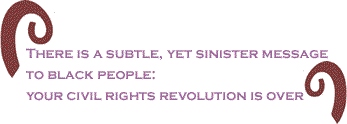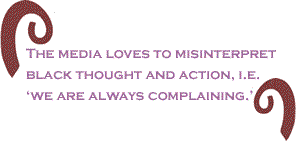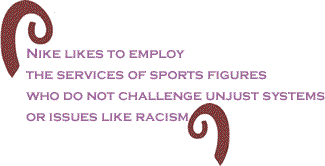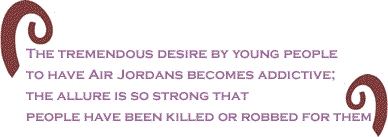
|
|||||||||||||||||||||
 |
|
|
Nike continues its assault on the black community. Like a drug dealer, Nike promotes its products in as many places as possible; like the drug dealers' wardrobe and their "bling," Nike is shiny, even seductive in its presentation. Nike’s latest affront comes via another Michael Jordan commercial. In the commercial, young kids, primarily black are doing Jordan moves and mannerisms on various basketball courts as he smiles approvingly as if the torch has been passed. On the surface, this may seem quite innocent. However; subtle messages abound. Historically, the media has mostly failed to show the diversity of black life - its faith, its intelligence, its work ethic, and its relationships. However, the white-controlled media is particularly adept at showing its negative side via most hip-hop videos (hypersexuality, violence, and misogyny) and the news (black men being arrested and beaten unmercifully, not letting O.J. Simpson out of their consciousness). Additionally, the media loves to misinterpret black thought and action, i.e. "we are always complaining," "slavery ended over one hundred years ago," "we don’t work hard enough," and countless other pseudo analyses. Disrespecting the black community is nothing new to Nike. In a previous Black Commentator article (June 23, 2005) I noted how Nike mocked black worship by featuring basketball superstar LeBron James as some sort of basketball messiah and comedian Bernie Mac as the "preacher" in a basketball court which is set up like a church made up of famous basketball players such as Jerry West and Julius "Dr. J" Erving as "congregants." Bernie Mac proclaims the coming of a "savior" and initiates the "call and response" style found in some black churches by asking the congregation "Can I get a lay-up?"
This devilish commercial implies that black people just focus on Jesus and does not recognize or appreciate the Holy Trinity (God and the Holy Spirit). Another example of Nike’s disdain of the black community lies in its use of one of the most important songs of black sociopolitical analysis in Gil Scott-Heron’s "The Revolution Will Not Be Televised." In this particular offense, black basketball stars like Jason Kidd are shown handling and passing the ball and shooting the ball with Heron’s music in the background. (Gil, why did you let them do this?) With this commercial there is a subtle, yet sinister message to black people: your civil rights revolution is over; now it consists of consumerism, stick it to "The Man" (white male establishment) and that black power now lies within sports, by playing basketball, and driven by buying Nike shoes. The sad reality of this commercial is that Nike IS "The Man" and laughs all the way to the bank. In short, through this commercial Nike is saying that it is "keeping it real" as the hip-hop community would say. Revolution is real; Nike’s imagery placates and misinforms. Revolution tears down unjust systems, Nike IS an unjust system. In a sense, Nike commercials are a comment on black consumerism; there is more emphasis on black people buying athletic shoes than buying homes, cars, or computers. However, the white controlled media have no problems making sure that blacks (especially women) are featured or a part of cleaning product commercials or fast food commercials like McDonald's. The hip-hop community, as powerful consumers, must learn and decipher this ruse.
Nike is also a master of doublespeak and confusing young people. In a 1993 commercial featuring Charles Barkley, he proclaims "I am not a role model. Parents should be role models." On the surface, this is true. Nevertheless, Nike embraces Barkley as a model of athletic prowess and sports achievement which makes him a de facto role model. Moreover, Nike, in choosing Barkley, subtly embraced and exploited his "bad boy" image and outspokenness. Nike implies that Barkley is some revolutionary figure (and therefore Nike is revolutionary), one that should be emulated and outspoken - when it comes to sports. Nike likes to employ the services of sports figures who do not challenge unjust systems or issues like racism. If Nike existed in the 1960s it would have never employed the services of Muhammad Ali or Jim Brown in their prime. A prime example of how Nike confuses young people
is my nephew, Edward. When he was 14 we got into a conversation
about Nike when he asked me to buy him some Nikes for his birthday.
I told him that I would be happy to do so but that I did not
buy Nike products due to their labor practices. I pointed out
that Nike was accused of using child labor in Pakistan and exploited
Vietnamese workers in many areas,
I still have faith that my beloved nephew will wake up. This brings us to Michael Jordan and the essence of Nike. Nike is about the art of illusion (as most multinational corporations) and its main purveyor is Michael Jordan. With Nike products, especially Jordan’s overpriced shoes, you are led to believe that you can play basketball better, that you can "be like Mike," that you are a trendsetter, and that your life would be better if you have those shoes. If you believe this imagery, then we must explore the other images you inherit when you buy a Michael Jordan product: You inherit a lack of political consciousness: It has been well documented that Jordan would not even support Harvey Gantt, an early civil rights leader, when he was running for a Senate seat in Jordan's home state of North Carolina against Jesse Helms, called by writer David Halberstam ''the nemesis of Carolina blacks (among many others).'' Republicans buy sneakers, too, Jordan said. However, Jordan temporarily shed his fear of politics and white people when he endorsed Senator Bill Bradley for president. It was a safe move for him in a number of ways: he had already made enough money so that he would not have to work the rest of his life and he was supporting another former professional basketball player. Perhaps if Gantt was an athlete maybe Jordan would have supported him. You buy an overpriced shoe: According to www.instyleshoes.com, prices of Air Jordans range from a low of $59 up to $5,000 for the "Retro" Jordan I. The latest Air Jordans (XXI) cost approximately $180. These shoes are status symbols, they are highly desired from the ghettos to the suburbs. Owners believe this product can make you feel good, just like crack cocaine. The tremendous desire by young people to have Air Jordans becomes addictive; the allure is so strong that people have been killed or robbed for them. The only difference between Nike and the drug dealer is that Nike sells legal products, the drug dealer does not. However, the desire for Air Jordans and drugs have something in common: they both tear at your soul. Both are created via exploitation. Both represent capitalism at its worst. You buy the image of a "good" Negro: In many ways, Jordan and Nike do good things for communities. Nike and Jordan’s Jordan Fundamentals grant program (now in its 7th year) helps teachers purchase resource materials, supplies, software, and other items to fulfill their lesson. The program, to date, has given out $6 million in education grants. However, what is $6 million when Jordan is worth hundreds of millions of dollars and Nike co-founder Phillip H. Knight is worth 5.7 billion dollars? Six million is pocket change to them; the grant program is good public relations. However, the drug dealer is quite similar to Nike - he or she may dole out niceties like giving out turkeys to poor people at Thanksgiving, presents at Christmas or even paying for people’s college tuition. This is noble on the surface; nevertheless, the drug dealer is the drug dealer, selling destruction to consumers wanting to feel good and making money while doing it. Nike, in a sense, does the same thing; this should force us to ask what the real price of Air Jordans is or what we get when we buy Air Jordans. We get an image: a smiling, grinning, gentle commercial machine. He gives us a pleasant smile on commercials - an Aunt Jemima, Uncle Ben’s, Kool-Aid smile reflecting a politically-neutered persona ready to please everyone. Despite his lack of politics, I still think he was a great basketball player and a driven competitor.
Finally, as we examine Nike, the Jordan shoe, and the drug dealer we must analyze what each does to our psyche and what they mean to our communities. In sum, I believe the following prose (also used by DuBois) provides an interesting insight which could describe Nike and a drug dealer:
- William Vaughn Moody Reverend Reynard N. Blake, Jr., M. S. is an ordained Baptist minister and is an assistant to the pastor at Tried Stone Baptist Church in Detroit. He earned his Master of Science degrees in Community Development and Urban Studies from Michigan State University and a Bachelor of Arts degree in English from the College of Charleston (SC). He lives in East Lansing, Michigan and can be reached at [email protected]. |
|
| Home | |
Your comments are always welcome. Visit the Contact Us page to send e-Mail or Feedback or Click here to send e-Mail to [email protected] e-Mail re-print notice
If you send us an e-Mail message we may publish all or part of it, unless you tell us it is not for publication. You may also request that we withhold your name. Thank you very much for your readership. |
|
| March
9, 2006 Issue 174 |
||||||||||||||
|
||||||||||||||
|
||||||||||||||
| Printer Friendly Version in Plain Text or PDF format. Download free Adobe Reader. | ||||||||||||||
 |
||||||||||||||
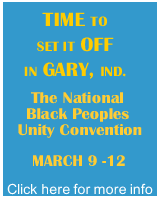 |
||||||||||||||
 |
||||||||||||||
 |
||||||||||||||
| |
||||||||||||||
| |
||||||||||||||






















